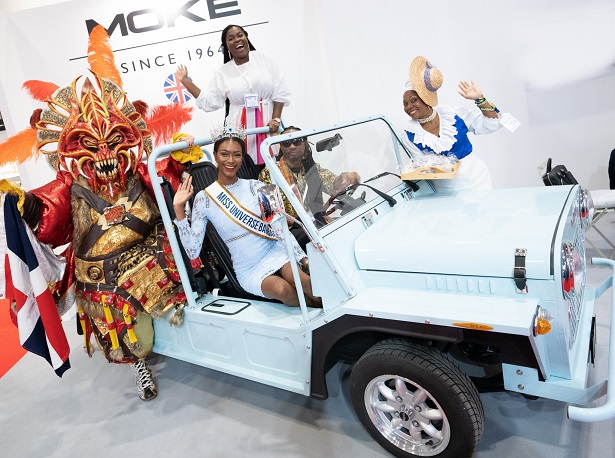British 1960s icon revitalised with the launch of the Electric Mini Moke at World Travel Market
A British icon from the 1960s was given a new lease of life today with the launch of the electric Mini Moke at London’s World Travel Market.
The car, that starred in the cult TV series The Prisoner and once boasted owners including George Harrison and Brigitte Bardot, was launched at the world’s largest travel show with a host of colorful characters in attendance, including current Miss Universe Barbados Shanel Ifill and a number of exotic dancers.

The new model is firmly aimed at the hotel industry. Robin Kennedy, commercial director for Moke International, said the new model is based on the classic design but upgraded with modern materials and manufacturing techniques. “We’ve re-engineered it as a utility vehicle for luxury hotels,” he said.
The new Cargo Moke unveiled at WTM can be used at hotels, resorts and golf courses to transport guests and equipment around the grounds. The standard vehicles are already a familiar sight on numerous Caribbean and Indian Ocean islands.
Its presence at WTM London will, Kennedy says, give it access to potential customers in the hotel and resorts sector around the world.
The vehicles can operate either as a four-seater to carry guests or pick-up truck style for luggage and equipment.
“Hotels can also use Mokes to improve operations by getting staff and equipment around more quickly and efficiently, and with the new electric vehicle, in an environmentally-friendly way as well,” says Kennedy.
Car hire companies are another target for sales, promising to give everyone a chance to experience some of that 1960s style. The electric Moke has a range of 90 miles and a potential top speed of 75mph.
The drive to go electric in the travel industry is not confined to land. Vancouver-based Harbour Air, whose floatplanes carry more than 500,000 passengers a year, has announced plans to make its fleet of 30 aircraft all-electric. And Norway is hoping to have electric planes for all its domestic flights by 2040.
